by California Casualty | Firefighters |
This Guest Blog post is by blogger Michael Morse. Rescue Captain Morse, the blogger behind Rescuing Providence, is the featured article in our Firefighter & EMT News Resource: Flashpoint. To sign up to receive Flashpoint in your inbox once a month, click here!
Spring Cleaning
Everything she owned was in that house-everything she had ever owned. Nearly eighty years is a lot of time to acquire things, magazines stacked from floor to ceiling, boxes stacked on boxes, filled with things she owned. Furniture covered every inch of the three-bedroom place, mostly old, but a few new pieces scattered here and there. Most people consider their space in square feet, Mildred counted hers in cubic feet, and every inch needed to be filled.
The overflow spilled out of the entry door into the vestibule, where more “things” were stacked. From there, a path of stuff led to the driveway, where two mini-vans sat, idle for years, crammed with more things. One of the vans had a three cubic foot space where a driver might be able sit, if she crammed herself in, but visibility would be impossible, except perhaps for straight ahead. I don’t thing there has been much forward sight here, every inch of the premises reeked of life already lived.
She held on to the doorframe, digging her fingers into the greasy wood, refusing to leave. “I can’t leave my babies,” she said, frantic, panic setting into her eyes, eyes that had seen a lot, and had let go of little. Cats prowled through the clutter, seemingly everywhere, then nowhere, and then everywhere again. The stench making our eyes water and stomachs churn, bile rising in our throats as we tried to pry Mildred away from everything she had. Had ever had. There would be dead cats under her things, of that I was certain. The live ones didn’t have long to go either, and would be collected by Animal Control, quarantined, evaluated and most likely euthanised.
Then, Mildred’s things would be put into dumpsters by workers dressed in white de-con suits, with artificial respirators to keep the diseased air out of their lungs, the very air that I breathed into mine every second that we lingered in the doorway. I knew she was ill, and living in absolute squalor and disease, yet I simply could not drag her away from her world, the only one she understood, and take her to the hospital where she would be stripped, and showered, and given clean clothes, and put in a sterile room where air flow and empty space would suffocate her. Intelligence burned brightly in her vivid blue eyes, eyes as clear as my own, and I knew she was far from legally incompetent. She could not, and never would understand how these strangers entered her world and dragged her away, never to see it or her “babies” again.
“Mildred, we have to go. Your neighbors complained about all of the stuff and the cats. We have a court order that says we have to take you to the hospital for an evaluation before you can come back. It will only take a few hours.”
She looked me in the eye, and I saw defeat and resignation in hers.
“Promise I’ll be home again?” she begged, the loosened her grasp, letting go of the doorframe.
I gained her trust only to betray her. It was the only way to get her to leave without physically dragging her, kicking and screaming away from her home. The crowd grew, and the spectacle grew along with it, so I did my best to restore a sense of normalcy, and made promises that I knew were empty, and took her hand and led her away, past the nosy neighbors, some of whom shook their heads and tsk tsk’d as we marched past them. There were no goodbyes, no see you when you get back, no get well soons, just a little old lady holding a stranger’s hand and walking to an ambulance and into a new, frightening life.
A person needs space to grow, using past experiences as a guide while forging ahead. The weight of decades of living must be shed as the years progress lest the weight of our accumulations make moving forward impossible. We need to let go in order to flourish, make room for new things and experiences, and learn to give up what once held importance, but with time became nothing more than a burden. There is a lot to be said about starting fresh, and getting a new start. Every day is a new beginning, memories that we cherish, lessons we have learned, mistakes made and overcome all take their place in the forging of what that beginning will become. Mildred was lost in the accumulation of what was, never letting go, and never moving forward. We rode to the Emergency Room quietly, her on the stretcher, lost in a world of her own thoughts, me behind her, writing my report, and trying to be objective with my words.
I have faith in most of the people I work with, and the folks at Elderly Affairs do a remarkable job with the limited resources at their disposal, but I couldn’t lose the sinking feeling that Mildred would be lost in the shuffle, and the people who took her “case” would miss the connection to the woman who tried desperately to hold on to the only thing she knew. Perhaps it is better that they did not see the squalor, be immersed in the odors, see the poor little kitty cats as they scurried through the debris. Maybe they would see this as a fresh case, an opportunity to show a woman who needed their help how to let go, and start anew.
I certainly hope so.
I heard on the news that there were over forty cats in her home, which had been condemned and scheduled for demolition. Some of them were suitable for adoption.
I spent my days off cleaning my basement. It was time to let go of some things, and make room for something new.
________________________________________________________________
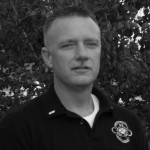 Captain Michael Morse is a Rescue Captain in the Providence Fire Department’s rescue unit and author of two books: “Rescuing Providence” and “Responding.” His blog was voted the winner of the 2012 CalCas Battle of the Blogs ‘Top Firefighter & EMT Blog.’ Cpt. Morses’s books & blog are great resources for EMTs and Firefighters- full of advice, news briefs, and day-to-day insider stories. To learn more about Captain Morse, check out our interview with him!
Captain Michael Morse is a Rescue Captain in the Providence Fire Department’s rescue unit and author of two books: “Rescuing Providence” and “Responding.” His blog was voted the winner of the 2012 CalCas Battle of the Blogs ‘Top Firefighter & EMT Blog.’ Cpt. Morses’s books & blog are great resources for EMTs and Firefighters- full of advice, news briefs, and day-to-day insider stories. To learn more about Captain Morse, check out our interview with him!
by California Casualty | Educators, Firefighters, Nominate a Hero, Nurses, Peace Officers |
Click here to cast your vote for February’s Hero of the Month!
Name: Jody W.
Profession: Registered Nurse (Home Health Nurse)
Nominated by: Stephen N.
In December 2011, Jody W. saved a complete stranger’s life. As a Nurse, this wasn’t really something new; saving lives is in the job description. But this time was different; this time Jody saved a man’s life by giving him her kidney. Growing up, Jody saw the struggle of kidney disease and the life-saving power of organ donation first hand. Her close family members battled kidney disease, and several were given a new lease on life through organ donations. In July 2011, Jody put herself on a donation transplant list as a non-directed donor. Not even 5 months later, she was cleared to donate and matched with a recipient. In December, moments before her surgery, Jody got to meet the recipient of her kidney and his family. He is now doing well and on December 8th, 2012, Jody and the recipient celebrated their 1-year transplant anniversary! Jody is also very dedicated to international health and has been on 13 mission trips in Central America. She says she plans to use any prize money from Nominate a Hero on her next trip to Honduras!
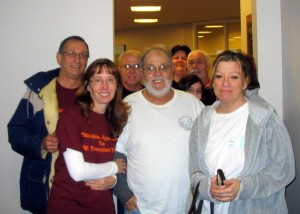
Jody, the recipient of her kidney, and their families on the day of the operation.

Jody and the recipient looking GREAT 6-months post-surgery!
Name: Keven R.
Profession: Sheriff’s Deputy
Nominated by: Joel H.
Deputy Keven R. was on patrol in Dallas when he happened to notice something peculiar: a car’s brake lights sticking out of a lake. He immediately drove down to the reservoir, pointed his patrol car’s headlights across the water’s surface and got out of his car. That’s when he realized that the car was slowly sinking- with two young women trapped inside. Deputy Keven R. immediately took off his utility belt and waded into the freezing water. He then swam to the car and shattered the car window’s glass. Inside, the two women were beating on the window, begging for help and telling him that they could not swim. He pulled both women out of the vehicle, ‘bear-hugging’ them as he swam them back to safety. Rowan barely got both women to shore before the car was completely submerged. Amazingly, the entire ordeal was captured on the Deputy’s patrol car dash cam. Check it out below:
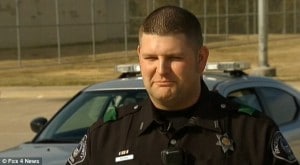
Deputy Keven Rowan
Name: Bradley H.
Profession: Volunteer Firefighter & EMT, Full-time EMT
Nominated by: Joyce H.
Brad got his start in firefighting as volunteer at only 18-years-old. Now, he serves as a full-time EMT while still volunteering his time as both an EMT and Firefighter. In March of 2011, Brad was called to a residential fire. When he arrived, there was already heavy smoke coming from the home. Recognizing the urgency of the situation, Brad and his team bravely entered the home–without gear–to rescue a bed-ridden woman trapped on the second floor. Within minutes, Brad and crew had the patient secured in an ambulance and on her way to the hospital. For his heroic action and quick-thinking, Brad was awarded the Medal of Valor.
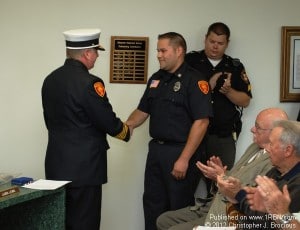
Brad H. receiving a Medal of Valor and Lifesaving from his Fire Chief.
Name: Mrs. Ridge
Profession: Educator
Nominated by: Vicky P., Debra P., Ginny B., and Zena B. (Parents of current and previous students)
Parents of Mrs. Ridge’s students simply cannot say enough about the impact this inspiring educator has on their children, both academically and personally. They note her ‘incredible spirit, kindness, generosity and excellence as a teacher and citizen.’ Comparing her teaching abilities to being ‘able to leap tall building in a single bound,’ they shared all the ways her dedication and innovation has inspired their children to develop a love for learning. Mrs. Ridge is known for the family-like atmosphere she fosters in her classroom and unique ability to tailor a lesson plan to a diverse group of students by truly getting to know each of her students. She has also been known to dip into her own pocket to make sure she can give her students the very best despite budget cuts in her school district, even going so far as to provide lunches for students that would otherwise go without and donating used clothes from her own home to her students’ families. This educator is truly viewed as a ‘hero’ and ‘angel’ by her students and their families.

Mrs. Ridge and a former student
by California Casualty | Firefighters |
This Guest Blog post by blogger Firefighter Wife is the featured article in our Firefighters’ News Resource: Flashpoint. To sign up to receive Flashpoint in your inbox once a month, click here!
Why is my Fire Wife such a Grinch?: A Guest Blog post by Firefighter Wife blogger Lori Mercer
 I’ve been married to my firefighter for over 10 years now. He’s been a firefighter for all that time. It’s all I know. And when we were young with infants in our arms and toddlers constantly underfoot, I was a hot mess of a young fire wife. I would stand at the front door at 6 am with an already fussy baby in my arms praying the 3-year-old would sleep another hour. And I’d cry as he walked out with his evil gear bag. I’d cry about why he was leaving to go have breakfast at the fire house instead of spending 10 more minutes with me. Later that day, I would imagine the wildest rescue accident possible, starring my firefighter as the victim. And when I couldn’t reach anyone at the station phone, I’d turn on the local news to confirm it wasn’t really happening. I’d fall asleep before he’d call at night and wake up angry. Convinced some toxic malice overtakes him at the firehouse and he falls out of love with me while there, refusing to call and say good night.
I’ve been married to my firefighter for over 10 years now. He’s been a firefighter for all that time. It’s all I know. And when we were young with infants in our arms and toddlers constantly underfoot, I was a hot mess of a young fire wife. I would stand at the front door at 6 am with an already fussy baby in my arms praying the 3-year-old would sleep another hour. And I’d cry as he walked out with his evil gear bag. I’d cry about why he was leaving to go have breakfast at the fire house instead of spending 10 more minutes with me. Later that day, I would imagine the wildest rescue accident possible, starring my firefighter as the victim. And when I couldn’t reach anyone at the station phone, I’d turn on the local news to confirm it wasn’t really happening. I’d fall asleep before he’d call at night and wake up angry. Convinced some toxic malice overtakes him at the firehouse and he falls out of love with me while there, refusing to call and say good night.
Yes, these are real life thoughts in the head of a young fire wife. You can chalk it up to postpartum hormones or 29-year-old learning-to-be-married selfishness. But now, only 11 blink-of-an-eye years later, my 40-year-old wisdom has finally got a grip.
Oh how I wish I could bottle my lessons up in magic fairy dust and send one to every new fire wife out there.
Maybe, just maybe, some of you can relate to these crazy fire family dynamics. And nothing makes the fire wife grinch come out on attack like the holiday season. Oh how can the holidays frustrate a fire wife. Let me count the ways.
- 12 Hours of Overtime
- 11 times being asked where your husband is while single-mom-ing the church Christmas party
- 10 gifts still left to wrap by yourself on Christmas Eve
- 9 -to-5ers bragging about 14 days off work with their family
- 8 little gifts to find for the guys on his crew
- 7 dozen cookies to bake for the neighborhood cookie exchange
- 6 text message photos from the store to figure out which gift is best for the father-in-law
- 5 upset family members because you can’t attend family Christmas on the day planned because he’s on shift
- 4 different plans to explain why Santa is arriving the morning of the 24th instead of the 25th
- 3 hour drive, by yourself, with kids in tow and car packed to the hilt, to celebrate Christmas without him at your parents
- 2 bickering kids who are missing their Daddy
- 1 tired firefighter who took a very hurt baby girl out of a mangled car at 1 am and doesn’t want to hear you whine about any of these minor annoyances
You’re a mean one, Mrs. Grinch! Is that really all I can think about? Does my firefighter really want to hear the replay AGAIN of how we’re going to pull off Santa’s arrival on the 23rd? Or another play-by-play of the conversation with the sister-in-law? Is this ringing any angelic bells for you?
Want to know some secrets that will melt your ice queen’s heart this holiday season?
Maybe not but I’m going to tell you anyhow. Here’s a little background info on what might be running around her pretty little head:
The first few years of our marriage, I spent fighting and resisting the firefighter family system. I literally grieved the holiday traditions I shared growing up with my family. I struggled to find a rhythm when one year it was Christmas on the 23rd and another on the 26th and every 3rd year we could actually travel together. I craved our own set of family traditions for the holidays and took the control freak approach to planning perfect family memories for those 12-hour periods he was home and awake on a December weekend. Putting up the tree. Driving around to see the lights at night. Baking and decorating cut out cookies with the kids.
It became forceful and stressed as I tried to fit my family traditions into the new firefighter lifestyle.
Here’s the clue. She is GRIEVING. Not rejoicing and fa-la-la-ing.
She might know only her family life traditions and yearns for sharing that with you. But like everything else in marriage, it’s new and different, and especially really weird with this wacky fire service schedule. And you only get one chance a year to test it out. Then next year, it’s different again. And some crappy years, she loses you for Thanksgiving AND Christmas AND New Year’s. And some really, really crappy years it’s Leap Year and happens twice in a row.
Here’s what NOT to say to a wife in this delicate state:
- “You know I have to go to the station. Why is this different than any other day?”
- “It’s no big deal. I’ll be home tomorrow and we’ll celebrate then.”
- “Go on and enjoy yourself at my family’s Christmas without me.”
- “Don’t wait for me. You can put the tree up with the kids.”
- “I’ll call/text you a lot.” (And then don’t. Because firefighters have busy days. But broken promises do more damage than the hope they hold.)
- “When you visit me at the fire house, it will be just like we’re all together for Christmas.” (No. It’s not just like that. It’s like celebrating with you and 8 other prankster boys. )
- “Why don’t you cook up a nice dinner for you and the kids at home on Christmas day?”
- “The kids won’t even notice what day we open gifts.”
So what *should* you do and say?
You’ve got to be on her team. To join in the cause. Simply recognize her efforts. Be understanding of those feelings. Help her grieve. Ask her how she’s feeling and brainstorm ideas for how to make it all work. If you really want to wow her, surprise her with thoughtful new traditions specially designed for your little fire family. Special ornaments. A firehouse recipe you make at home. Be present with her on your off days and enjoy some holiday cheer together.
Basically, remember the Who’s in Whoville who loved Christmas a lot. The truth is, it’s not about when or where or how you celebrate. Because Mrs. Grinch, Christmas, means a little bit more. You’ve already got the keys to heart and only you know best how to make it grow.
(PS – If she’s still a hot mess, you might want to hook her up with a bunch of other understanding fire wives in our private community at FirefighterWife.com. It’s been said multiple times that this group has helped many women understand their firefighters better and improve their marriages!)

_____________
 Lori Mercer is a fire wife and mother of 4 running the Firefighter Wife community with a goal to strengthen fire marriages and be an encouragement to fire wives. She owns Picture Your Life, her Consulting Business for Internet Marketing and Web Development. Currently she cannot wait until July 25, 2013 for the first annual “Flame Fest” Fire Wife Gathering where she will finally meet in person so many amazing fire wives from the online community. Basically, she’s on fire for fire families and long over the Fire Wife Grinch stage.
Lori Mercer is a fire wife and mother of 4 running the Firefighter Wife community with a goal to strengthen fire marriages and be an encouragement to fire wives. She owns Picture Your Life, her Consulting Business for Internet Marketing and Web Development. Currently she cannot wait until July 25, 2013 for the first annual “Flame Fest” Fire Wife Gathering where she will finally meet in person so many amazing fire wives from the online community. Basically, she’s on fire for fire families and long over the Fire Wife Grinch stage.
Read more at the Firefighter Wife Blog! Click here!
To find her on Facebook, click here!
To follow the Firefighter Wife on Twitter, click here!
by California Casualty | Educators, Firefighters, Nominate a Hero, Nurses |
Nominate Your Hero Here!
Congrats to Mark R – our Hero of the Month for December. You can read every finalist’s story below!
Name: Scott D.
Profession: Registered Nurse
Nominated by: Barbara S.
Described as an inspiration to all who know him, Scott is a Registered Nurse working as a home visitor with a hospice unit. Before going into nursing, Scott saved lives as a combat engineer & infantryman with the US Army, jump master, parachute trainer, rescue scuba diver and former Fire Chief. Scott also frequently volunteers to work with the homeless, buying them food and helping them find services and resources. He has also worked with the Veterans Association, attending military funerals and visiting homebound veterans. In his role as a hospice nurse, Scott often brings his beloved dogs with him on home visits. He even volunteered to adopt a veteran’s dog when the owner moved into an assisted living facility. Scott’s nominator, Barbara, describes him as ‘a true hero to his neighbors and friends’ who ‘has been there to help when no one else stepped up.’
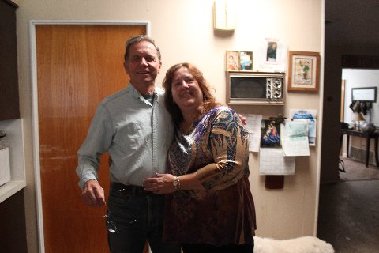 Scott D. and his nominator, Barbara
Scott D. and his nominator, Barbara
Name: Mark R.
Profession: Firefighter & EMT
Nominated by: Jessica M., a former patient
Mark and Jessica met under the worst of circumstances. A driver crashed into a car carrying Jessica and her daughter, Kendra, on a backwoods rural road. Mark and his team responded to the scene. As responders worked on freeing Jessica from the vehicle, she remembers Mark crawling into the car beside her, assessing her medical state and updating her on Kendra’s condition. “He not only took care of me that day, he held my hand, made me human not just a patient,” remembers Jessica. Following the accident, Mark traveled to check on Jessica’s daughter after she underwent brain surgery. Even now, Mark continues to keep tabs on Kendra, responding whenever she has a medical emergency, even if he’s off-duty, and organizing fellow firefighters to help build a wheelchair ramp for her home. Seven years after their fateful meeting, the three remain close friends.
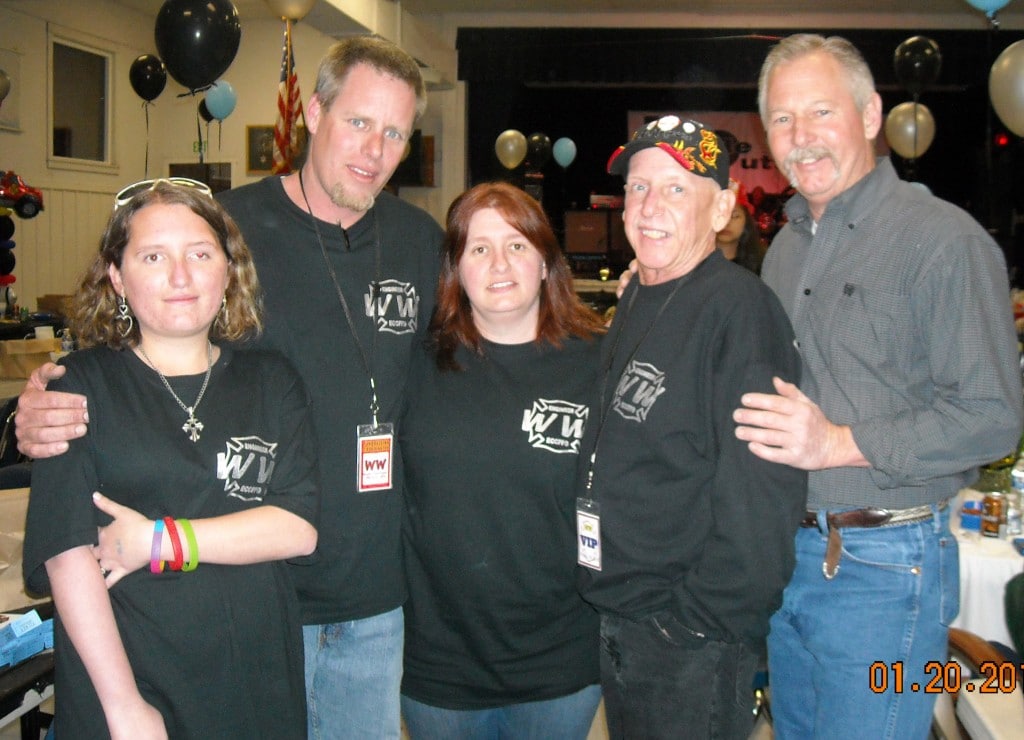 From Left to Right: Kendra, Mark, Jessica, Willy and Bill. Mark, Willy and Bill all responded to the accident.
From Left to Right: Kendra, Mark, Jessica, Willy and Bill. Mark, Willy and Bill all responded to the accident.
Name: Marilyn M.
Profession: Educator
Nominated by: Kendra N.
Marilyn has dedicated more than 40 years of her life to Education. She got her start in the early 70’s, teaching deaf and blind students in one of the first programs developed specifically for these children. Marilyn then moved to a small Alaskan village to teach Special Education. For years, she traveled around Alaska evaluating and writing programs for severely handicapped children and teaching Special Education and Kindergarten. After 30 years of teaching, Marilyn retired to Oregon and began working as a Reading Teacher. Motivated by her own struggles as a young student, she has a passion for helping students learn to read and write. Her successful reading program has helped countless young students over the course of her career. Marilyn retired from teaching in 2002, but continued to pursue her passion for education by working as a teacher’s aide, reading assistant and librarian. She is still actively working and volunteering in the Oregon school system, where ‘her excellence in teaching and working with young kids has always been apparent to the kids, the parents, other staff, and administration.’
 Marilyn and one of her students in Alaska in the 1980’s
Marilyn and one of her students in Alaska in the 1980’s
Name: John B.
Profession: Firefighter & Paramedic
Nominated by: Lori B., his wife
The son of a Chief of Police and Registered Nurse, John knew he wanted to be a Fireman at age 2. John started his Firefighting career roughly 38 years ago and launched his nonprofit, Firefighters for Fun, just 8 years later. He now travels the country educating children with his fire truck and ambulance classrooms, passing out extensive resources and spreading his ‘If you can be Heard, you can be Rescued’ motto. The life-saving potential of John’s mission was proved just a few weeks ago, when a wheelchair-bound man was saved from a dangerous house fire after his neighbors were able to find and rescue him thanks to a whistle John had given the man just months earlier. John uses all his spare time, including vacations, raising money for Firefighters for Fun, even converting another old fire truck into a mobile restaurant serving up food and fire knowledge at state fairs to help raise funds.
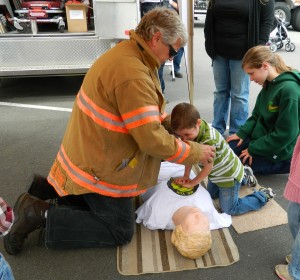 John teaching children CPR using his HOTS (Helping Others to Survive) Ambulance Classroom
John teaching children CPR using his HOTS (Helping Others to Survive) Ambulance Classroom
by California Casualty | Firefighters |
It’s almost Thanksgiving!
I don’t know about you, but my visions of Thanksgiving usually look more like this:
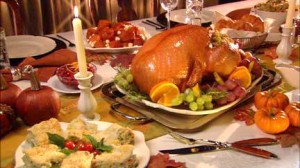
Yummmmm.
And hopefully not at all like this…
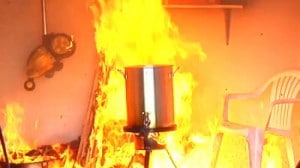
Yikes.
But the truth is…
Thanksgiving is the leading day of the year for home fires involving cooking equipment.(*)
This year, as we gather to give thanks for our families & blessings, let’s protect those very people & things by practicing safe cooking.
Here are some Tips from the National Fire Protection Association and The Red Cross:
- Never leave the kitchen when you are cooking on the stove top. Unattended cooking causes fires.
- Keep potholders and food wrappers at least 3 feet away from heat sources while cooking
- Stay at home while turkey is cooking and check on its progress frequently
- Keep children at least 3 feet away from the stove, hot foods and hot liquids. Steam or splash from gravy, vegetables or coffee could cause serious burns
- Wear tighter-fitting clothes with shorter sleeves while cooking
- Set timers to keep track of food items that require extended cooking times
- Turn the handles of pots and pans on the stove inward, away from the edge, to avoid accidents
- Follow all manufacturer guidelines regarding the appropriate use of appliances
- Keep the floor clear so you don’t trip over toys, bags or other clutter while walking with hot food
- Keep all knives, sharp cooking utensils, matches and lighters high up, away from the edges of counter tops, to keep kids safe
- Keep electric cords for electric knives, coffee makers, warmers and mixers tucked away- kids can pull on the cords and be harmed by falling equipment or tangled cords could get too close to stove tops or heating plates.
- Test your smoke alarms!
- After guests leave, designate a responsible adult to walk around the home and double check that all candles are extinguished and all cooking or heat sources are turned off
by California Casualty | Firefighters |
It was weird watching Hurricane Sandy through my front window rather than through the windshield of Rescue 5. It seems as though every major storm that passed through New England over the last twenty some odd years waited for me to start my tour. Sad truth is, I liked that just fine. It’s easy being alone during bad weather, even if the job you are doing is hard. This time, things were different; I had to ride it out at home.
Being home and helpless is difficult. As the winds picked up velocity and the branches of the trees, and the trees themselves shook, and shattered and fell to the ground I could do nothing but watch. My window was as close to the action as I would get, and I was not all that crazy about standing too close to that window! I found it difficult to sit still and watch things go flying by, but there was nothing I could do to change what was happening.
Nature’s fury is a little less intimidating thanks to advances in technology. By pressing a button we are able to track a storm, know when it’s coming, when it’s going, how much rain to expect, how strong the winds will be, and a whole bunch of other information like barometric pressure and things like that that mean absolutely nothing to me. What did matter was the fact that I knew that this too would pass, and the lights will come on, and hopefully stay on, and life will return to normal. This confidence in our ability to weather a storm is a luxury only afforded the most recent generation, prior to us people hunkered down when the wind blew, hopeful it would end, but not knowing if things would get worse before they got better.
Maybe things were better that way, and some fear was instilled in humanity. Humility and appreciation seem much more appetizing when not sure if at the next moment everything could end, or be forever changed. Alas, humility has never been my strength, and as I watched the chaos outside of my window I knew it would all be over soon. The TV told me so.
I’ve often said that it’s our families that deserve the credit when we are out doing our thing, but I never really believed it. I thought I believed it, and if questioned would vociferously defend that statement, but as the windows shook, and more branches fell, and another tree succumbed to the eighty mile an hour gusts, and my heart pounded a little harder than I thought possible, and I contemplated calling 911 to report trees in the wires, I realized just how much I had taken the family I left behind for granted. I was nervous, and worried, and it was not a feeling that I’m used to. My family was used to it, having been left alone during emergencies for years.
I enjoy nothing more that being called to action, and braving the elements while responding to some emergency or other. It’s an adrenaline rush like no other, fighting natures wrath on the way to save some poor soul from whatever predicament they find themselves in. Even the most wildly lived lives consist mostly of boring routine, and the chance to challenge the elements and make a difference and break the monotony is one I live for. Losing myself in an emergency is easy, and life affirming, and an enormous ego boost.
It’s a wonder I can even fit my head through the doorway of our home, where I weathered this storm, miserable, knowing that I was missing all of the fun.
And my wife stood by, busy with her routine, comfortable in her place, batteries ready, candles where they needed to be, dinner for days prepared, ice in the cooler, crossword puzzle books and some games next to the battery operated radio.
She was prepared. I was not. Somewhere in my thick skull the notion that I was above commoners in terms of severe weather readiness resided. Let the hurricanes, blizzards, heat waves, tornadoes and earthquakes come; I am ready, willing and able to respond to those emergencies! But prepare for them? Not even close. Preparation is dull, part of that 90% monotony called life. Preparation for things that “might” happen is far different than responding to things that “did” happen.
In my arrogance I failed to allow myself to live a moment in my families shoes. It is frightening enough to be at the mercy of the elements, hoping that the walls keep the weather out, and the basement stays dry, and the roof remains in place. Hunkering down during a storm is highly underrated. It takes more courage than I ever imagined, and I cannot begin to imagine one of us being out during the worst of it. I honestly don’t think I have what it takes to keep the home together, and stocked, and prepared. Sure, I can put beer in the fridge, and get cans of tuna and a manual opener, but can I keep my emotions in check when the house is shaking and the person I love is not there?
Being prepared is harder than responding. True strength of character is necessary, as well as leadership, courage, and faith. Anybody can take care of things after they happen, waiting for and being ready for anything that might happen, and doing so when you are terrified and your other half is gone takes a special person.
Storms will come, and storms will go, and each one is different in its intensity and potential for inflicting damage. Hurricane Sandy was a doozy, blazing a path of death and destruction through the eastern states. Truly heroic acts were performed by our first responders, and I watched the events over and over on my TV, proud to be part of that world, all the while humbled and awed by the heroes under my own roof.
________
 Captain Michael Morse is a Rescue Captain in the Providence Fire Department’s rescue unit and author of two books: “Rescuing Providence” and “Responding.” His blog was voted the winner of the 2012 CalCas Battle of the Blogs ‘Top Firefighter & EMT Blog.’ Cpt. Morses’s books & blog are great resources for EMTs and Firefighters- full of advice, news briefs, and day-to-day insider stories. To learn more about Captain Morse, check out our interview with him!
Captain Michael Morse is a Rescue Captain in the Providence Fire Department’s rescue unit and author of two books: “Rescuing Providence” and “Responding.” His blog was voted the winner of the 2012 CalCas Battle of the Blogs ‘Top Firefighter & EMT Blog.’ Cpt. Morses’s books & blog are great resources for EMTs and Firefighters- full of advice, news briefs, and day-to-day insider stories. To learn more about Captain Morse, check out our interview with him!
 Captain Michael Morse is a Rescue Captain in the Providence Fire Department’s rescue unit and author of two books: “Rescuing Providence” and “Responding.” His blog was voted the winner of the 2012 CalCas Battle of the Blogs ‘Top Firefighter & EMT Blog.’ Cpt. Morses’s books & blog are great resources for EMTs and Firefighters- full of advice, news briefs, and day-to-day insider stories. To learn more about Captain Morse, check out our interview with him!
Captain Michael Morse is a Rescue Captain in the Providence Fire Department’s rescue unit and author of two books: “Rescuing Providence” and “Responding.” His blog was voted the winner of the 2012 CalCas Battle of the Blogs ‘Top Firefighter & EMT Blog.’ Cpt. Morses’s books & blog are great resources for EMTs and Firefighters- full of advice, news briefs, and day-to-day insider stories. To learn more about Captain Morse, check out our interview with him!













